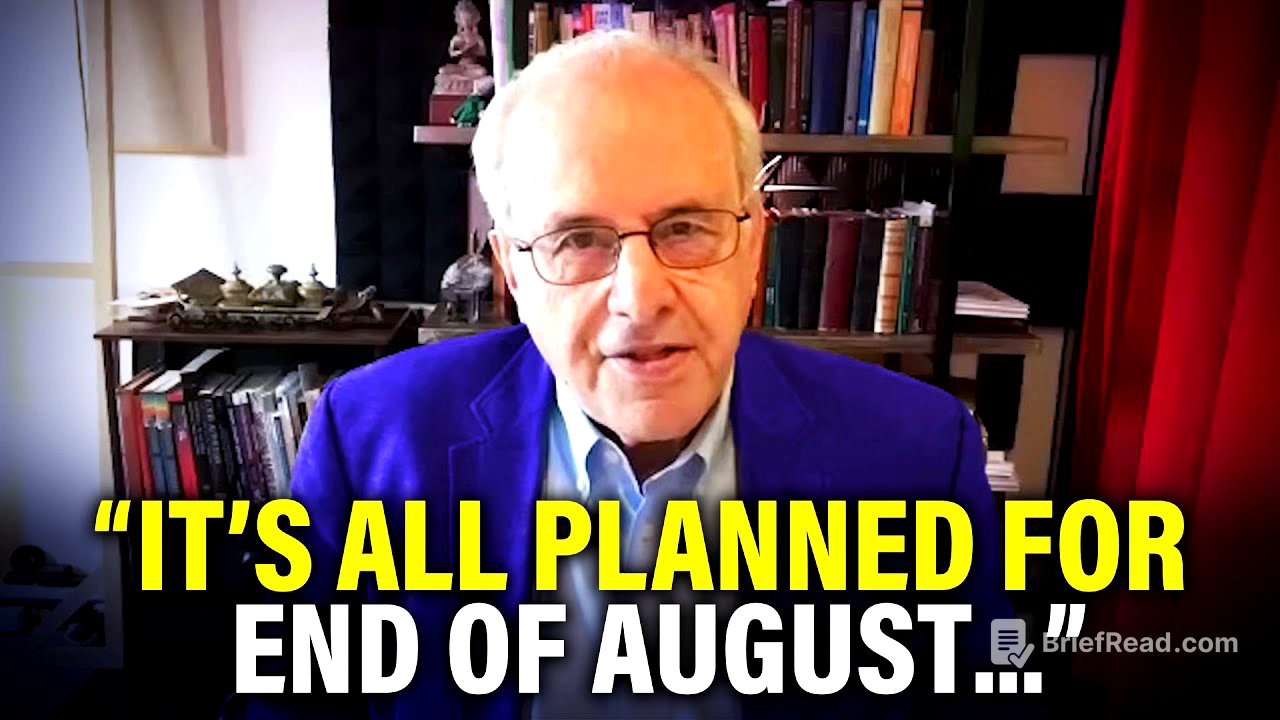TLDR;
The speaker discusses the decline of the American capitalist system and its empire, drawing parallels to historical empires like the British. He argues that the US is in deep economic trouble due to wealth redistribution, stagnant wages, and increasing debt. He also addresses the rise of China as a global competitor and criticizes the denial and warfare tactics employed by the US. The speaker urges listeners to confront reality, learn from history, and seek a better relationship with emerging powers to avoid further decline and potential conflict.
- US capitalism is in deep trouble, facing its greatest difficulties.
- Wealth has been radically redistributed from the bottom and middle to the top over the last 40 years.
- Real wages for American workers have stagnated since the 1970s, leading to increased debt and family pressures.
- The US is in denial about its economic decline and the rise of China as a global competitor.
- The speaker urges listeners to confront reality, learn from history, and seek a better relationship with emerging powers to avoid further decline and potential conflict.
Introduction: The State of US Capitalism [0:00]
The speaker begins by stating that the United States' economic system, capitalism, is in severe difficulty, the worst he has witnessed in his lifetime. He attributes this to a widespread denial among political, cultural, and economic leaders regarding the true state of affairs. The speaker aims to break through this denial by presenting his observations on US capitalism, which he has studied throughout his life.
The Rise and Fall of Empires: A Historical Perspective [2:13]
The speaker frames the current situation within the context of historical empires, such as the Greek, Roman, Persian, and British empires, noting that they all rise, evolve, and eventually decline. He points to the British Empire's disintegration, marked by the American Revolution, as a key example. The American Empire emerged from this disintegration, resolving internal contradictions like slavery through the Civil War, which allowed capitalism to flourish.
The American Century: Economic Growth and Exceptionalism [5:06]
From 1870 to the 1970s, the United States experienced a century of uninterrupted economic growth, with rising real wages for workers and even faster-growing profits for capitalists. This led to a sense of American exceptionalism and the belief that this upward trajectory would last forever. However, signs of decline began to emerge, leading to denial among leaders.
Denial and Economic Realities: Wealth Redistribution and Stagnant Wages [8:40]
The speaker highlights that over the last 40 years, there has been a radical redistribution of wealth from the bottom and middle classes to the top, exacerbated by changes in tax laws favoring corporations and the rich. Real wages in America stopped rising in the 1970s, a significant shift that was largely ignored. This led to women entering the workforce en masse and Americans accumulating debt to maintain consumption levels.
Debt and Family Pressures: Cracks in the Empire's Foundation [15:30]
The American working class accumulated debt through mortgages, car loans, and credit cards, while family structures became more strained, leading to high divorce rates and increased psychotropic drug use among women. The speaker emphasizes that the system's commitment to inequality has worsened, with workers' productivity increasing while their wages remain flat. The COVID-19 pandemic and subsequent inflation have further exacerbated these issues.
Historical Parallels: The Case of Germany [19:27]
The speaker draws a parallel to post-World War I Germany, where the working class faced defeat, hyperinflation, and the Great Depression, leading to the rise of Adolf Hitler. He suggests that the economic blows faced by the American working class could have similar destabilizing effects.
The End of the Dollar's Dominance and the Rise of China [22:41]
The speaker asserts that the US dollar's dominance as the international currency is ending, with countries like China, Russia, and Saudi Arabia moving towards an alternative currency. He presents GDP figures to demonstrate China's rise as a major economic competitor, contrasting it with the US and Russia. China's consistent high annual growth rates have propelled it to this position.
Warfare and Denial: The US Response to China's Rise [28:07]
The speaker criticizes the US response to China's rise, including trade wars and sanctions, which have proven ineffective. He argues that the conflict in Ukraine is essentially a war aimed at weakening Russia, a key ally of China. Despite predictions of Russia's economic collapse, the Russian economy has remained relatively stable due to alternative buyers for its oil and gas.
The Need for Confrontation and Adaptation [36:04]
The speaker urges listeners to confront the reality of the situation and learn from the British Empire's example of adapting to the rise of the United States. He suggests that the US should seek a better relationship with China, acknowledging its strengths and potential for mutual learning. He criticizes the US military presence in the China Sea as a threatening and counterproductive strategy.
The Role of the People and the Dangers of Denial [38:17]
The speaker concludes by emphasizing that the mass of people, the working class, must confront the challenges facing the US, as corporations and the wealthy are unlikely to question the system that benefits them. He warns against denial and calls for an honest assessment of the country's economic and political realities to avoid further decline and potential conflict.









